Super Bull VPN
Decentralized Privacy Guardian
Enjoy a private, secure, and free internet experience, connect globally, and earn Cowcoin tokens
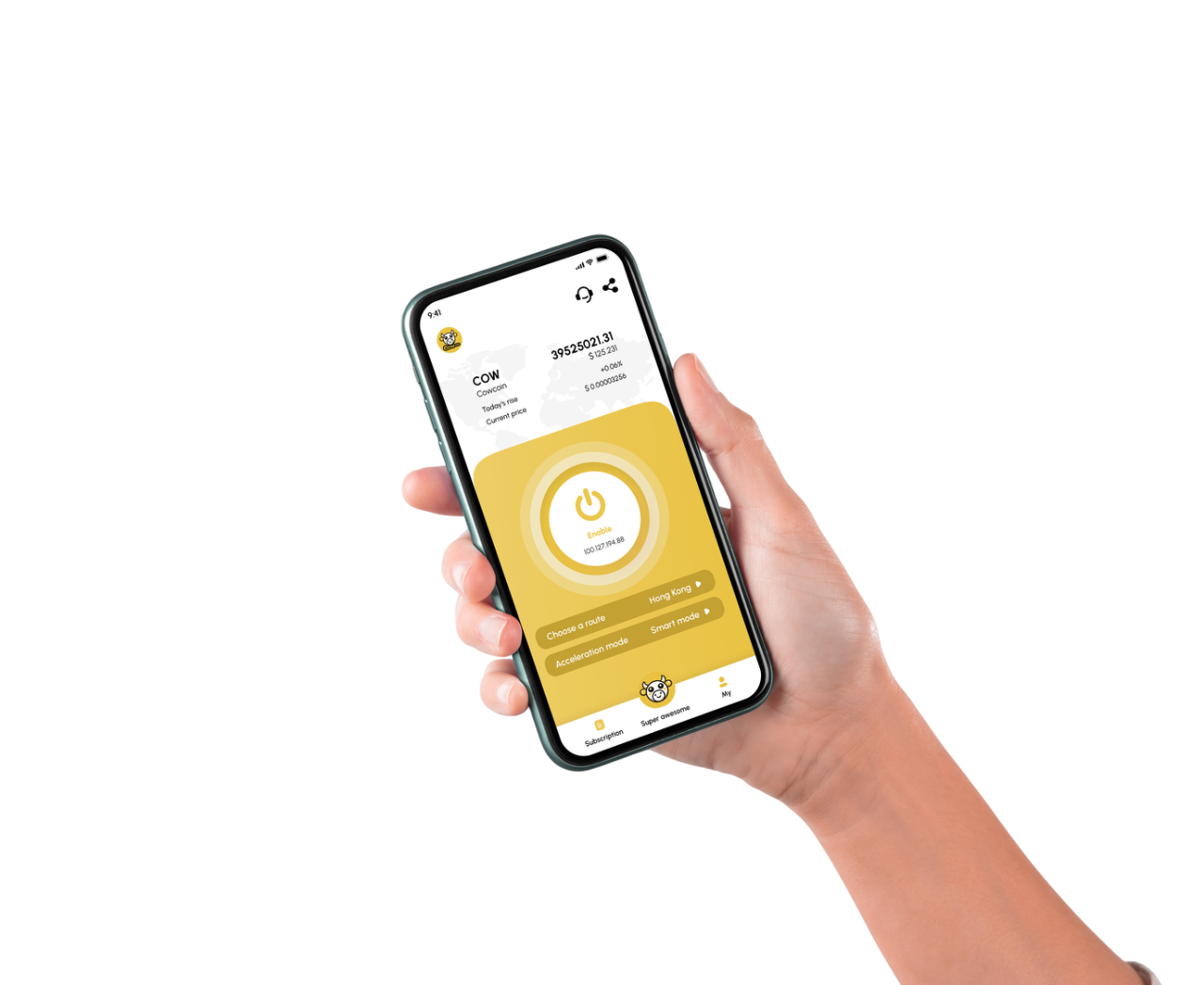
Windows
Apple
Android
Linux
Router
Chrome
Firefox
 Edge
Edge Playstation
X-Box
Apple TV
Other
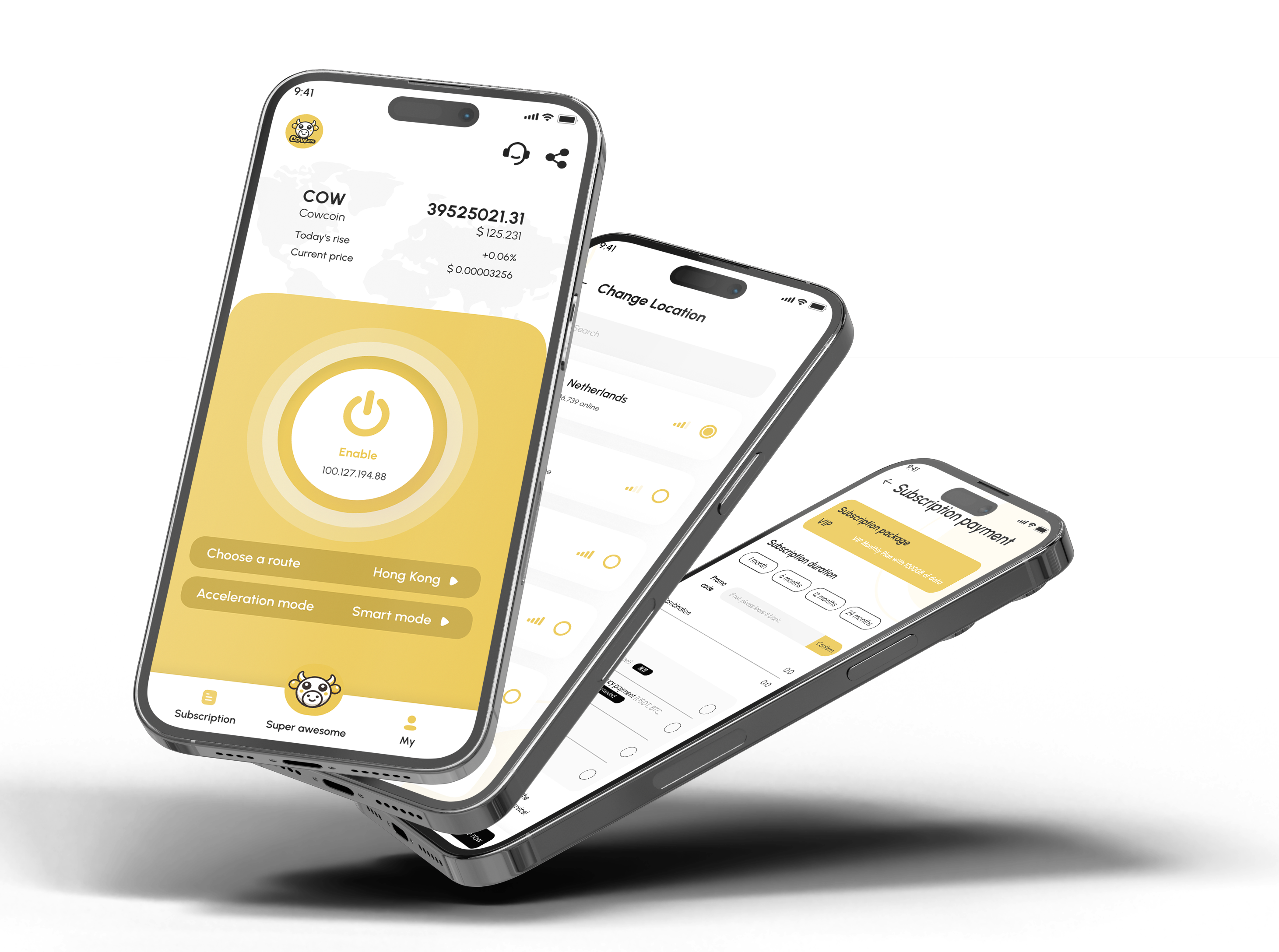
about service
Decentralized VPN Service
Super Bull VPN is a blockchain-based decentralized VPN service. By utilizing distributed nodes and blockchain technology, Super Bull VPN overcomes the privacy, performance, and security challenges of traditional VPNs, ensuring that user data cannot be tracked or interfered with by third parties.
Super Bull VPN has no centralized servers. All traffic is transmitted through globally distributed nodes, avoiding single points of failure and privacy leakage risks.
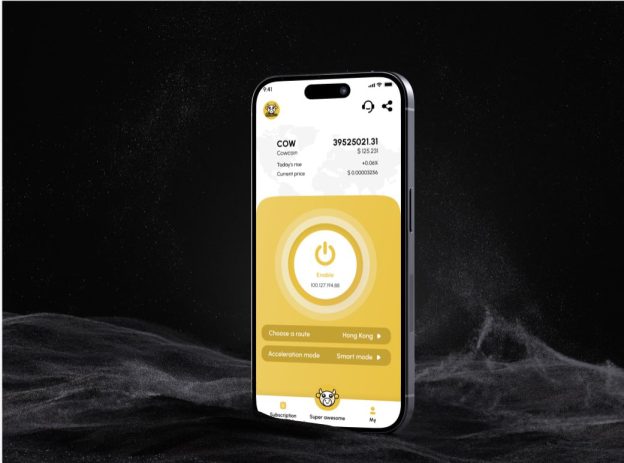
Privacy Encryption
Privacy Policy and Security
Super Bull VPN uses advanced encryption protocols to multi-layer encrypt user traffic, ensuring that data is not intercepted or tampered with during transmission.
The decentralized traffic management architecture effectively reduces the risk of privacy breaches associated with traditional centralized VPN servers.
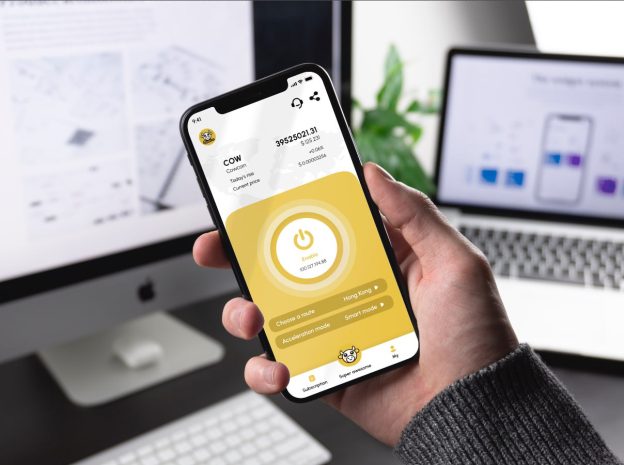
Privacy Encryption
APP Features
The Super Bull VPN app supports multiple platforms, including iOS and Android, allowing users to easily download and connect to VPN servers worldwide.
A user-friendly interface with simple operation allows users to connect to the optimal node with just one click.
The APP automatically selects the best server based on network conditions to ensure the user always gets the smoothest
2 hours of free use per day
Users can use it for free for 2 hours every day to quickly experience the functions and advantages of Super VPN.
2
hours
prices
Choose Your Subscription Plan
Our service allows you to hide your geolocation, bypass blocking and protect your data. Join over 150 thouthand people who trust Cow.cmVPN to keep their life safe.
Monthly Subscription
$ 6.00
- Online privacy protection
- Network acceleration
- Automatic income system
Half a year Subscription
$ 35.00
- Online privacy protection
- Network acceleration
- Automatic income system
Annual Subscription
$ 53.00
- Online privacy protection
- Network acceleration
- Automatic income system
Two-Year Plan
$ 99.00
- Online privacy protection
- Network acceleration
- Automatic income system

Benefits and Advantages of VPN
1- Privacy Protection
Decentralized architecture and multi-layer encryption ensure the highest security for user data.
2- Bypass Geographical Restrictions
Access global content anytime and anywhere without being restricted by regional limitations.
3- Cowcoin Token Rewards
Users earn token rewards while using the VPN, gaining extra benefits alongside the service.
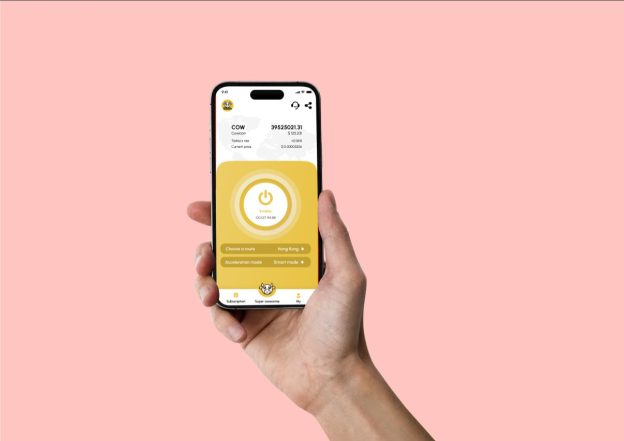
Our Advantages
1- Global High-Performance Nodes
Provide stable, low-latency network connections to ensure a great user experience.
2- Completely Transparent Service
Node performance and distribution are made publicly available, allowing users to choose with confidence.
3- Seamless Global Connection
With intelligent routing technology, Super Bull VPN provides users with seamless traffic connections worldwide.
testimonials
Customers’ Experience
Application
Frequently Asked Questions
What is a VPN and why do you need it?
- 什么是 VPN?
VPN(虚拟专用网络)是一种为用户创建安全隧道的技术,以便用户通过公共网络(如互联网)安全地访问专用网络或浏览互联网。它的工作原理是通过远程服务器路由用户的网络流量,隐藏用户的真实 IP 地址并加密连接。这增强了隐私和安全性。
简单来说,VPN 允许您像在本地网络上一样安全地访问远程网络,并在使用公共 Wi-Fi 时保护您的数据。
为什么需要 VPN?
- 保护隐私:VPN 会隐藏您的真实 IP 地址并加密您的互联网流量,防止个人信息被泄露或跟踪。无论是浏览网站、在线购物还是使用社交媒体,VPN 都能提供额外的隐私保护。
- 增强安全性:公共 Wi-Fi 网络(例如咖啡馆、机场等)通常不太安全,更容易受到黑客攻击。VPN 会加密您的互联网流量,防止您的数据被拦截,从而提高您的安全性。
- 绕过地理限制:许多网站和应用程序根据地理位置限制访问。例如,某些视频平台可能只在特定国家/地区提供内容。通过连接到其他位置的 VPN 服务器,用户可以绕过这些地理限制并访问更多内容。
- 避免数据监控和广告跟踪:VPN 有助于防止广告商、互联网服务提供商 (ISP) 和其他第三方跟踪您的在线活动。它可减少个性化广告并确保更高的在线匿名性。
- 远程访问公司网络:公司使用 VPN 允许员工安全地连接到公司的内部网络,实现远程工作或访问公司资源,而不会面临数据泄露或网络攻击的风险。
总结:VPN 是保护在线隐私、增强网络安全和访问受限内容的重要工具。它对于保护个人信息、避免互联网监控以及在不安全的网络环境中安全地使用互联网特别有用。
Can a VPN help bypass geo-blocks?
Yes, a VPN can help bypass geo-blocking.
Geo-blocking refers to the practice of restricting access to websites, apps, or services based on the user’s geographical location. For example, some video platforms (such as Netflix, Hulu, or BBC iPlayer) may only allow users from specific countries or regions to access their content. A VPN helps bypass these geographical restrictions by routing your internet traffic through a server in another country, changing your IP address, and making it appear as though you are accessing the internet from a different location.
How to bypass geo-blocking:
Connect to a VPN server in another country: Choose a VPN server located in a country or region where the content you want to access is available. For example, if you want to access Netflix content from the U.S., you can connect to a VPN server in the United States.
Bypass content restrictions: The VPN encrypts your traffic and hides your real IP address, using the IP address of the target country to access restricted content.
In summary: A VPN is an effective tool for bypassing geo-blocking, allowing you to access content that is restricted based on your location, including videos, music, news, and other services. It enables users to enjoy global internet resources.
How does a VPN work and how does it protect my data?
A VPN (Virtual Private Network) works by creating a secure and private connection between your device and the internet. It routes your internet traffic through an encrypted “tunnel” to a remote VPN server, which acts as an intermediary between you and the websites or services you access. This process ensures that your data remains private and secure from third parties.
Here’s how a VPN works step-by-step:
Encryption: When you connect to a VPN, it encrypts your internet traffic. This means that any data you send or receive (such as passwords, messages, and browsing history) is scrambled and unreadable to anyone who might try to intercept it, such as hackers or malicious third parties.
Changing Your IP Address: The VPN assigns you a new IP address based on the server you connect to. This hides your real IP address, which can be used to track your online activities and location. By masking your IP, the VPN helps protect your privacy and anonymity while online.
Secure Connection: The VPN creates a secure, private connection between your device and the VPN server. Even when you’re using public Wi-Fi (which is usually unsecured), the VPN protects your data from being intercepted by encrypting it. This prevents hackers from spying on your online activity, especially in places like cafes, airports, or hotels.
Bypassing Restrictions and Censorship: VPNs also allow you to bypass geo-restrictions and censorship by masking your location. This enables you to access websites and services that might be blocked or restricted in your country or region.
How does a VPN protect your data?
Privacy Protection: By masking your real IP address, a VPN prevents websites, advertisers, and other third parties from tracking your online activities and gathering personal information.
Data Security: The encryption used by a VPN protects sensitive data from being exposed when you use public networks, such as Wi-Fi at coffee shops or airports. It prevents hackers from accessing your data, which is especially important when entering sensitive information like login credentials or credit card details.
Protection from Surveillance: A VPN helps protect you from being monitored by your Internet Service Provider (ISP) or government agencies, ensuring that your online activities remain private.
In summary, a VPN protects your data by encrypting your internet traffic, masking your IP address, and providing a secure connection, especially when using public or unsecured networks. It enhances privacy, security, and anonymity online.
Do I need a VPN if I already use an antivirus?
Yes, even if you are already using antivirus software, a VPN is still important for additional protection.
Here’s why:
Different Functions: Antivirus software and VPNs serve different purposes. Antivirus software is designed to detect, block, and remove malicious software (viruses, malware, spyware) from your device. A VPN, on the other hand, focuses on securing your internet connection by encrypting your data and masking your IP address, protecting your privacy while browsing online.
Enhanced Privacy: Antivirus software does not hide your IP address or prevent websites, advertisers, or other entities from tracking your online activities. A VPN ensures your privacy by masking your real IP address, making it harder for third parties to track you.
Protection on Public Wi-Fi: While antivirus software helps protect your device from malware, it doesn’t secure your connection when using public Wi-Fi. A VPN encrypts your internet traffic, protecting you from hackers or other malicious actors who might attempt to intercept your data on unsecured networks, such as those in coffee shops or airports.
Bypassing Restrictions and Censorship: A VPN allows you to access geo-blocked or restricted content by masking your location, something antivirus software doesn’t do. This is especially useful for accessing streaming services, websites, or apps that are blocked in certain countries.
In summary, while antivirus software is essential for protecting your device from malware and other threats, a VPN adds an extra layer of security and privacy, especially when browsing online or using public Wi-Fi.
What data does a VPN protect and how long is it stored?
A VPN protects several types of data, and the duration for which data is stored depends on the VPN provider’s policy. Here’s how it works:
What data does a VPN protect?
Internet Traffic: A VPN encrypts your internet traffic, which includes everything you do online—browsing websites, sending emails, using apps, and streaming content. This encryption ensures that your data remains private and cannot be intercepted by third parties, such as hackers or your ISP (Internet Service Provider).
Personal Information: When using websites or online services, a VPN helps prevent your personal information (such as login credentials, credit card details, or any sensitive data) from being exposed during transmission.
IP Address and Location: The VPN hides your real IP address and replaces it with one from the VPN server, making it harder for websites and advertisers to track your browsing activity or identify your physical location.
Online Activities: A VPN masks your online activities and ensures that your browsing habits, search history, and online behavior are not visible to your ISP, government surveillance, or third-party trackers.
How long does a VPN store data?
VPN Provider Logs: Many VPN providers claim they have a “no-logs” policy, meaning they do not store any user data or online activities. However, some VPN providers may store minimal connection logs (such as timestamps or IP addresses) for troubleshooting or legal purposes, but this is generally for a very short period, usually 24-48 hours. Always check the provider’s privacy policy to understand their logging practices.
Data Retention: Most trusted VPN providers do not store any data that could identify you or track your activities after the session ends. However, in cases where data is stored (for example, for billing or customer support), it is typically kept for as long as necessary to fulfill that purpose, after which it is deleted.
In summary, a VPN protects your internet traffic, personal data, and online activities by encrypting them and hiding your IP address. Most reputable VPN providers do not retain logs or store data that could identify you, but it’s essential to check each provider’s specific privacy and logging policies to understand their data retention practices.

